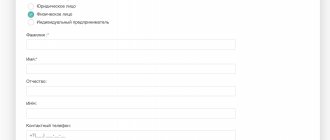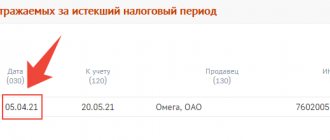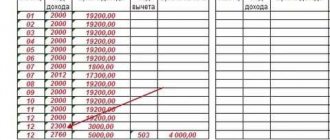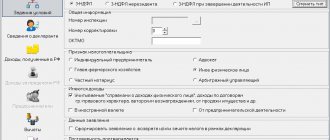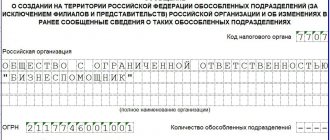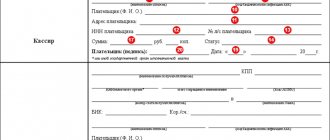Blocking a current account by the tax authorities: what you need to consider
The Tax Code provides for several reasons for blocking an account. It is worth noting that they have one thing in common - the decision to suspend transactions on accounts issued by the inspectorate to the bank is valid until the banking organization receives a resolution from the Federal Tax Service to cancel the blocking. This means that, regardless of the reason for the restriction, contacting the bank with a request to unblock the account is pointless. All issues are resolved exclusively by the tax office at the location of the organization, and if the company is large, then at the place of registration of the owner.
It should be noted that the decision to unblock the account is handed over by the Federal Tax Service inspector to a representative of the banking organization against a receipt. The document can also be sent to the credit institution electronically if remote interaction has been established between the bank and the Federal Tax Service.
This form of document exchange is discussed in paragraph 4 of Art. 76 Tax Code of the Russian Federation. In some cases, the inspectorate may send a message about unblocking to the bank by registered mail. As a rule, this is done in cases where there is no remote communication channel. Formally, the law is observed. But since the transfer even within the same city takes several days, the duration of the process of unblocking the account also increases, causing inconvenience to the entrepreneur. In this case, you cannot make a claim to the tax authorities, since the postal option for delivering the decision is permitted by legislative acts.
Deadlines for unblocking in case of tax arrears and its repayment
In accordance with paragraph 8 of Art. 76 of the Tax Code no later than the next day after receiving information about the collection of tax arrears, the head or deputy head of the Federal Tax Service Inspectorate makes a decision to cancel the suspension of transactions on the account. After this, it must be sent to the bank in the manner established by Bank of Russia Regulation No. 440-P dated November 6, 2014.
The communication schedule (appendix to regulation 440-P) determines the date and time the credit institution receives a decision from the fiscal department. In all cases, the decision is executed immediately after verification if it is received from 9:00 to 16:00 (on Friday - before 15:00).
Thus, the period for unblocking an account after paying taxes or other mandatory payments and penalties should not exceed three working days. In this case, the period is calculated from the day when the Federal Tax Service received information from the bank or from the taxpayer.
Blocked due to tax debt
This is the first and most common reason. In this case, the account is frozen due to the fact that the company has arrears in taxes, penalties and fines. The main misconception among many accountants is that the movement of funds in an account can be blocked only because of tax arrears.
In fact, tax sanctions can also cause a freeze. For example, you have paid off the debt in terms of fees or taxes, but you still have penalties and fines that you consider to be disputed amounts and are trying to somehow resolve them in pre-trial or even trial mode. These seemingly insignificant amounts may cause the tax office to block your current account. Therefore, if you are paying off any debts before the inspection, then do it in full.
How does blocking happen?
On this basis, transactions on bank accounts are not suspended completely, but only to the extent of the debt. Moreover, this is often not the real amount that comes as a result of working with a personal account, but the one that the tax authorities recorded in the decision to suspend operations.
For example, the real amount of debt is 1.5 million rubles, but the inspector blocked the account for only 1.2 million rubles, since, for example, we are talking about two federal taxes - income tax and value added tax. It was decided not to block the amount of accumulated property tax debt for now.
If there is more money in a bank account than the amount of debt, the business owner will be able to freely dispose of the remaining amount. If there are not enough funds in the account, it will be frozen until the debt is fully repaid.
It happens that the inspectorate for different categories of taxes (federal, regional, local) makes several decisions to suspend operations. The freeze occurs within the limits of the total amount of all debts. In their decisions, tax authorities can either take into account all the accounts that the organization has, or indicate only one or two specific accounts. That is, it may turn out that in one bank your accounts are frozen, while in another they are functioning quietly.
Nuances
The bank does not have the right to make an independent decision to block an account, so one should not assume that this is the arbitrariness of the banking system. The FCO in this case is only the conductor and executor of the decision of the Federal Tax Service, therefore there can be no negative or biased opinion on its part towards your company.
By the way, please note that tax authorities can freeze not only ruble accounts, but also accounts in foreign currency. In this case, the freeze will be valid within the amount of foreign currency equivalent to the amount in rubles at the Central Bank exchange rate at the time of blocking.
The decision to suspend account transactions has certain date requirements. That is, tax authorities can issue it no earlier than a decision on collecting tax debt. If this happens, you can contact higher authorities with a complaint, get the blocking lifted and appropriate punishment for officials.
How to unblock an account
The unlocking steps are quite simple. Since the freeze is canceled by the decision of the tax inspector, which he makes and transfers to the bank, your task is to present documents to the Federal Tax Service that confirm that the tax debt has been liquidated.
Such documents may include payment reconciliation data, which confirms that in fact you do not owe anything. If the debt is real, provide a payment order from the bank confirming that you have paid the debt.
If you are interested in quickly unfreezing your account, then the main task is to independently submit the necessary documents to the inspection, write an application in free form, and provide links to the attached documents.
After checking the documents, the tax authorities will issue a decision to cancel the blocking and transfer it to the bank. The deadline for execution is no later than 1 business day following the day of receipt of documents from the taxpayer. That is, if you submitted the documents today, then tomorrow the inspector is obliged to send the decision to the banking institution. The procedure is regulated by Art. 76 clause 8 of the Tax Code of the Russian Federation.
What else do you need to know
If the debt to the budget was written off from the company’s account in the collection mode according to a collection order, then formally the tax authorities receive a notification from the bank about the write-off. Based on it, they can decide to unblock the account. A personal visit to the tax office is not required. However, please note that in this case, the deadlines for sending the decision to the bank are periodically violated. To ensure that the account is unfrozen as quickly as possible, try to independently submit documents confirming the repayment of the debt.
If a company has all its accounts frozen, but one of them has enough funds to pay off the entire debt, you can try to unfreeze the others. As a rule, all accounts are blocked automatically, since the inspector does not know how much money is stored on them. Therefore, your task is to submit an application to unblock part of the accounts before the tax debt is written off, and fresh bank statements. In the application, indicate the details of the accounts that you want to unfreeze, and the accounts where there are sufficient funds to write off the debt.
How to unblock a current account?
To quickly unblock your current account, follow one of two schemes.
Find out the reason for blocking your current account
Contact the desk audit department of the Federal Tax Service at the place of registration of your company. When visiting the tax office in person, the tax director will need a passport, and the representative of the organization will need a passport and power of attorney. Employees of the desk audit department can tell you about the reasons for blocking an account over the phone, to do this, give the number and date of the decision, they can be found on the Federal Tax Service website or from employees of your bank.
Fulfill tax requirements: pay tax, submit a return or confirm receipt of a tax request...
Find out the cause and eliminate the violations. Provide documents that confirm payment of tax, submission of a declaration or receipt of a request for TKS during electronic document management with the Federal Tax Service.
...or provide a guarantee of payment of taxes if they are confirmed to be justified
If the reason for the arrest is non-payment of taxes, penalties or fines in a significant amount, you can avoid blocking the account. To continue working with your current account and calmly deal with the claims of the Federal Tax Service, replace the seizure of funds in your current account with other financial instruments. Provide the tax authorities with a bank guarantee, issue a pledge or guarantee from third parties. It is important to know that the tax office will accept a bank guarantee only if it is included in a special list of the Ministry of Finance.
A bank guarantee is an obligation of the bank, at the request of the Federal Tax Service, to transfer the required amount for the taxpayer. In other words, the bank gives a targeted loan to the organization to pay off the claims of the tax authorities.
To issue a guarantee, submit an application to the bank, provide reports and, after agreeing on all the conditions, attach the bank guarantee agreement to the application to remove the seizure from the current account. Interest rates on the guarantee are always significantly lower than on other loan products.
If the tax debt for the organization will be paid by a third party (for example, a parent or affiliated organization, founder, etc.), then a guarantee agreement is concluded between the payer and the Federal Tax Service. After signing a guarantee or pledge agreement, the Federal Tax Service must unblock the organization’s current account.
Notify the tax service that the violation has been eliminated
Send the documents to the Federal Tax Service using the taxpayer’s account or provide them to the inspectorate.
Be sure to include a statement requesting to cancel the seizure of the current account.
Application form to cancel the decision to block a current account
If the reasons for blocking the account are eliminated, debit transactions on the bank account must be resumed no later than the next business day.
find out the reason for the blocking, eliminate it and notify the tax office. If you did everything correctly, your account will be unblocked the next business day.
Blocking account due to reporting
The reason for blocking in this case may be late submission of a tax return, as well as other tax calculations, for example, Form 6-NFDL. Formally, it is not a declaration, but it is still included in tax reporting.
Here you need to understand that accounts, of course, will not be blocked if you are 1-2 days late. If the delay is 10 days or more, the Federal Tax Service inspectors will be forced to send a decision to freeze the account. A similar sanction is provided for in Art. 76 Tax Code of the Russian Federation.
A big nuisance for an entrepreneur can be that not only the movement of funds will be frozen, but also the account itself, completely regardless of the balance on it.
Which companies most often face this?
This problem is often faced by representatives of small businesses who have not yet established electronic interaction with tax authorities and send their reports, including zero ones, by mail. Unfortunately, Russian Post is not the most efficient organization, so letters are periodically delayed during shipment, which leads to negative consequences for entrepreneurs.
If the tax authorities do not see your declaration during the desk period (within 10 days after the reporting deadline), then formally they have the right to block the account.
In the future, you can easily confirm that you sent your tax report on time using mail receipts. However, to avoid unnecessary hassle and a visit to the tax office, do not delay sending the declaration until the last day.
The best option is to establish remote interaction with the tax office. This can be done, for example, using software for exchanging documents electronically. With its help, you can generate reports and send them to the Federal Tax Service system in a timely manner. The software is ideal for individual entrepreneurs who do their own accounting and do not have special knowledge.
Most programs fill out reports automatically. You just need to enter data to calculate taxes (invoices, downloading reports from 1C). Also, some services remind you of the approaching date for submitting declarations so that you don’t miss it in the bustle.
What to do if your current account is blocked
To unblock a current account, it is enough to bring the reports to the inspectorate, as well as provide documents confirming the fact of submitting the reports (postal receipts, printouts from the declaration submission program, etc.).
The tax authorities are required to unblock the account immediately the next day and send the corresponding decision to the bank where you are served. By the way, you may have 5 current accounts, but only 1-2 will be blocked or, conversely, all at once. This will depend on the specific inspector making the decision. That is, everything here is individual.
Base 4.
According to Art. 10 of Law N 134-FZ, starting from January 1, 2015, a new basis for blocking an account appeared - the tax authority will be able to suspend transactions on bank accounts and transfers of electronic funds of the taxpayer if the obligation to transfer a receipt to the tax authority is not fulfilled. reception:
- requirements for the submission of documents (clause 1 of article 93 of the Tax Code of the Russian Federation, clause 2 and clause 4 of article 93.1 of the Tax Code of the Russian Federation);
- requirements for the provision of explanations (clause 3 of Article 88 of the Tax Code of the Russian Federation);
- notification of a summons to the tax authority (clause 4, clause 1, article 31 of the Tax Code of the Russian Federation).
The head of the tax authority (his deputy) has the right to make an appropriate decision if the taxpayer does not submit a receipt within 10 days from the date of expiration of the deadline for its transfer (clause 2, clause 3, article 76 of the Tax Code of the Russian Federation).
Let us remind you that it will need to be sent in electronic form via telecommunication channels within six days from the date the documents were sent by the tax authority (clause 5.1 of Article 23 of the Tax Code of the Russian Federation). It should also be noted that the effect of the provisions of Art. 76 of the Tax Code of the Russian Federation from January 1, 2015 will also apply to organizations and individual entrepreneurs who are required to submit declarations for the relevant tax, although they are not its payers (tax agents) (clause 3, clause 11, article 76 of the Tax Code of the Russian Federation). This could be, for example, organizations using the simplified tax system that have issued invoices with an allocated VAT amount. Starting from January 1, 2014, the obligation of such persons to submit VAT returns is established by the Tax Code of the Russian Federation (clause 5 of Article 173 and clause 5 of Article 174 of the Tax Code of the Russian Federation).
Blocking as a security measure for the fulfillment of tax obligations
The third situation that may cause the tax office to block a current account is blocking as a security measure for the fulfillment of tax obligations. This form of freezing is often faced by enterprises that have a tense relationship with the tax authorities. That is, legal battles have already taken place several times and a decision has been made, which at a particular point in time continues to remain unfulfilled.
What could be the problem? Tax officials made a decision based on the results of the audit. You, in turn, are in no hurry to implement it, but are engaged in the process of challenging it, trying to cancel it. After the inspector makes a decision to prosecute for committing a tax offense. they have the opportunity to take advantage of the provisions of Article 101 of the Tax Code of the Russian Federation. Paragraph 10 clearly states that blocking may be the norm for interim measures.
In what cases does a violation of taxpayer rights occur?
Despite the fact that blocking a tax account as a means of ensuring the fulfillment of tax obligations is a very common and frequently used measure, sometimes Federal Tax Service employees do this not entirely within the law. So to speak, the company is being manipulated because not all businessmen are savvy in law and cannot properly defend their rights.
The fact is that any interim measure for the fulfillment of obligations is clearly divided into property restrictions and monetary restrictions. Security inspectors can take advantage of the measure of blocking an account only after imposing a ban on the alienation of company property and if the total value of such property - all assets minus cash on the balance sheet - is less than the total amount of tax debt.
That is, this is a rather rare situation, although it is used very often by tax authorities as an interim measure. Unfortunately, such use is not always legal. Since the taxpayer does not have enough time to understand all the procedural intricacies, he does not think about the fact that this could simply be an excess of authority of the inspectors.
In fact, in many cases you can find a reason to punish tax officials. For example, he has the right to block not your entire account, but only the amount that will cover the difference between the size of your debt and the value of the property that has already been taken as an interim measure.
In practice, everything happens differently. No one estimates the value of the property based on the balance sheet, and the block falls on the entire amount of the account balance. This is very convenient for the Federal Tax Service, but extremely inconvenient for the company, as it causes unnecessary trouble in removing the account from being blocked. And this is a direct violation of taxpayer rights.
What should the company do in this case?
An entrepreneur faced with blocking an account as an interim measure must definitely check whether the amount of debt actually exceeds the value of all assets minus money according to accounting data. You also need to find out how much your account was blocked for. That is, the blockage fell on the entire balance of the account or, nevertheless, on the difference between the total assets on the balance sheet minus the amount that accounts for cash. This is a very important point that should not be ignored.
If the inspection violated the procedure for applying an interim measure, ignored the procedure for banning the alienation of property, or blocked the full amount, although it did not have the right to do so, then the decision to block the account is invalid. In this case, the company has the right to file a complaint with at least the head of the territorial tax office, as well as launch a procedure for filing a complaint and seeking a pre-trial settlement with the Federal Tax Service in your region.
Try to appeal the decision. It is clear that there is not always enough time and energy for such litigation, but if your account is blocked illegally at least once, then, believe me, similar measures will continue to be used. The absence of response measures on the part of the company to the violation of its rights will lead to the fact that accounts will continue to be blocked with or without reason.
How to unfreeze the account in this case
If you have figured out that the account is indeed blocked legally, and all procedures were carried out legally, then it is obvious that it will be possible to unblock it only after the decision of the Federal Tax Service has been executed. To unfreeze, the inspection must receive documents confirming the write-off of debts. Based on them, the tax authorities will make a decision to unblock the account and the procedure for lifting sanctions will be carried out within the time frame familiar to you (written above). The decision will also be sent to the servicing bank.
Action plan
1. Receive information about account blocking from the bank , or independently clarify the information through the tax service service.
2. Clarification of the reasons for blocking.
Reasons for blocking a current account:
2.1. Late submission of reports (for example, tax returns, 6-NDFL, DAM). In case of failure by the individual entrepreneur or company to submit reports within 20 days after the due date.
2.2. Errors in submitted reports. The individual entrepreneur or company submitted the reports, but due to errors in the calculations, they were not accepted by the tax department. This fact will be regarded as late reporting. In this case, the tax office will send a “Notice of recognition of the tax return as not submitted.” Such notification must be responded to within 5 days by submitting reports. If the deadline is met, the reporting will be considered submitted on time.
2.3. Blocking for non-compliance with electronic document management rules. The Tax Code of the Russian Federation (Clause 3, Article 80) establishes types of reporting that must be submitted only electronically using the TKS (for example, a VAT return). If you do not submit such reports or try to submit them in paper form, they will be considered failed.
2.4. Failure to pay taxes, penalties, and fines within the time limit established in the written request of the tax service. In this case, the blocking is set in the amount specified in the payment request, but applies to all accounts opened in banks, including foreign currency ones, i.e., as many accounts as possible, the amount for each current account will be blocked.
2.5. The receipt of documents from the tax service sent via TKS has not been confirmed. Upon receipt of requirements and notifications from the tax service under the TCS, companies and entrepreneurs are required to send a receipt for the acceptance of these documents. If the receipt of acceptance is not submitted within 10 days after the deadline, the tax office will send a decision to suspend transactions on the current account.
3. Elimination of reasons for suspension of transactions on the current account.
To eliminate the causes it is necessary:
3.1. Submit unsubmitted reports.
3.2. Submit reports with correct calculations.
3.3. Conclude an agreement with the EDF operator and send the necessary reports electronically via TKS.
3.4. In case of arrears of taxes, penalties, fines and insufficient funds in the current account, it is necessary to replenish the account with the missing amount in accordance with the collection order. In this case, the debt will be automatically written off in favor of the tax service.
If you also pay the arrears yourself, there will be an overpayment that will need to be repaid in the future;
3.5. Send a receipt for a request, notice, or respond to a request.
4. Waiting for the account to be unblocked.
If a current account is blocked for reasons related to reporting, the blocking must be lifted no later than the end of the next business day after they have been eliminated.
If the suspension of transactions was associated with arrears of taxes, penalties, or fines, the tax service will send a decision to cancel the suspension of account transactions only after the bank transmits information about the write-off of funds. This process can take a long time.
Have your account been blocked? Bridge Group specialists will help you understand the situation and restore access to funds.
To speed up account unblocking, you can use a new function: in the personal account of a legal entity and the personal account of an individual entrepreneur, submit an application with a request to unblock a current account (blocked for late payment of taxes). A qualified electronic signature will be required.
Blocking during electronic document management
Another situation in which the inspectorate blocks one or more accounts is electronic document flow with the Federal Tax Service. Imagine the situation. You do not take reports to the tax office, do not submit them via mail, but have installed modern programs for sending reports (for example, Kontur.Accounting, 1C: Cloud, Finguru) to simplify and speed up the procedure for sending reports as much as possible.
During the reporting period, without leaving the workplace, the accountant promptly sends correctly completed sets of reports, that is, he fulfills his duties on time. But at some point the account gets blocked, and you don’t understand what’s happening.
This can happen if the company has not sent a receipt for the electronic claim. That is, you submit reports on time, and the inspectorate receives them. You may have software installed for electronic document management, but tax authorities can send demands to you either electronically or in paper format at their discretion.
It is necessary to control mail in any format: both written and electronic. If you do not send the tax authorities a receipt of the request within 6 business days from the date it was sent to your address, then the Federal Tax Service has the right to block the account. This allows us to do Art. 23 Tax Code of the Russian Federation. The date of dispatch is recorded by the telecom operator and in case of a delay in the response from the company, the blocking will occur within 10 working days from the date of delay. The deadlines are also mentioned in Art. 76 Tax Code of the Russian Federation.
If any documents from the inspection, and, by the way, not only confirmation of submission of reports, come to your address through a telecom operator (EDO), try to open them and send a receipt. It is worth considering here that if, when submitting documents electronically, you receive requirements by mail, then you also need to respond to it. If the requirement contains information to provide any documents or a statement, then be sure to do so.
According to the innovation since 2015, the number of requests from the inspection must match the number of your responses, otherwise the account will be blocked in accordance with Art. 76 Tax Code of the Russian Federation.
How to unfreeze an account
Try to submit your application and submit all documents as quickly as possible. Tax officials decide to unfreeze the account after they receive the receipt.
They will have 1 more day to send the decision to the bank. That is, the procedure will take up to 2 days. The application is also written in any form; you can use any option that you consider necessary to formulate.
The tax office has blocked my bank account, but I have to pay salaries and rent. What to do?
The tax office has the right to block the company's current and foreign currency accounts and even accounts in precious metals. As a rule, in this way the Federal Tax Service punishes those who do not pay taxes on time and do not submit reports, but sometimes accounts are blocked by mistake. In any case, for the company, this is fraught with failure to meet deadlines for settlements with suppliers and contractors, deterioration of its reputation, refusal of loans and lost profits.
The tax office has the right to freeze an account under Article 76 of the Tax Code if the company:
- did not pay taxes, fines, penalties;
- did not submit a declaration, calculation of contributions or 6-NDFL report;
- did not send a receipt for documents received from tax authorities electronically.
Sometimes technical glitches occur in Federal Tax Service programs: for example, payments are lost or information about the enterprise taxation system is not reflected. Then they may mistakenly block the accounts of respectable companies and entrepreneurs.
All accounts of the violator opened on the basis of a bank account agreement are subject to distribution: settlement, foreign currency, and in precious metals. If accounts are opened in several banks, all are blocked. But loan, collateral, deposit and transit accounts are not touched.
Until the tax authorities’ decision is in force, an entrepreneur or legal entity will not be able to open a new account, deposit or deposit in another bank.
The tax office does not have access to the accounts, so it sends the decision to the bank, and the bank is obliged to fulfill the requirement within one business day. The inspector sends a copy of the decision to the taxpayer. But if the company is not connected to electronic document management and the letter with the decision is sent by mail, then the account will be blocked before it arrives. Then you can ask the bank for the number and date of the decision, call your inspectorate and ask on what basis the account was seized. By the way, banks are not required to inform the client about blocking the account, although some of them send notifications.
You can also constantly monitor the tax service: go to the website, select the item about suspensions, enter the INN and BIC and see if there is a block.
Ask your bank if it sends notifications about blocking: if not, then daily checks on the tax website will help avoid surprises.
If the tax office has blocked the account, the company will not be able to pay salaries, pay supplier bills, pay for the office and make other expense transactions. The account will be unfrozen only when the company pays the tax office.
However, you can accept payments to your bank account without restrictions. For example, clients can pay for goods or services - the money will be credited.
The tax office may block the account completely or partially - it depends on the reason for the blocking.
Partial blocking
If an enterprise has arrears in taxes, fines or penalties, the tax office will block only the amount of debt specified in the request. The rest of the money can be spent as you wish. But there is a nuance: the amount of debt will be seized on all accounts at once. For example, if a company has an arrears of 25 thousand rubles and three current accounts, then the tax office will freeze 25 thousand rubles in each of them.
Full blocking
If a company does not submit tax reports on time or does not send a receipt for accepting documents, the tax office will freeze all money in the accounts.
Here's what this means for the company:
- failure to meet deadlines for settlements with suppliers, contractors, and landlords;
- deterioration of reputation: tax debts and the presence of blocked accounts are visible on the Federal Tax Service portal;
- refusal of loans: the bank will not consider a loan application from a company that has problems with regulatory authorities.
There are a number of payments that are not subject to the freeze. Firstly, these are taxes, insurance premiums, fees, fines and penalties. Secondly, payments, the priority of which, according to paragraph 2 of Article 855 of the Civil Code, is higher than that of tax payments:
- compensation for harm to health and alimony, which are paid under writs of execution;
- severance pay, wages for former and current employees, royalties - collected under writs of execution;
- employee salaries.
The controllers' demands to write off arrears and salary payments have the same priority. Therefore, the bank will execute incoming orders in calendar order:
- if salary payments were received earlier than the requirements from the inspectorate, they will be executed before the tax arrears are written off;
- if later - after paying off the requirements of the Federal Tax Service.
Important! Social payments are not priority payments. Until the arrest is lifted, the company will not be able to pay employees sick leave, maternity benefits, and child care.
When the reason for the blocking becomes known, it is necessary to comply with the requirements of the tax authorities: submit reports, send a receipt, pay the arrears. If the account was seized by mistake, you need to write a statement to the inspectorate describing the situation and attach supporting documents to it:
- postal receipts and lists of attachments for sent reports;
- payment orders and bank statements for tax payments;
- latest reconciliation reports and certificates of absence of debts.
As soon as the tax office is convinced that its requirements are met, it will remove the blocking.
If there are debts to the budget, the process of lifting the blockage may be delayed. Even if the company repaid the debt as soon as it learned about the arrest of the account, payment through the treasury can take up to three days. Until the money reaches the tax office, the decision to block will not be revoked. Solution: submit a tax application with a request to remove the restriction on the account and attach copies of payment documents to it.
If the inspectorate has frozen several accounts for the same amount and there is enough money in them to pay off the debt, you can write a free-form application to the Federal Tax Service and ask to lift the arrest from the excessively blocked accounts.
The application must indicate:
- numbers of accounts that have enough money to write off the arrears;
- account numbers that the company asks to unblock.
To confirm that there is enough money to pay the claim, bank statements must be attached to the application.
If there is not enough money in the accounts to pay the arrears, you can ask the inspectorate to replace the arrest:
- on the guarantee of a third party;
- for a bank guarantee.
Important! The Federal Tax Service will agree to lift the arrest under the guarantee of only the bank that is included in the list of the Ministry of Finance.
If the inspection blocked the account unlawfully or violated the terms for lifting the arrest, then it must compensate the taxpayer for the inconvenience with money. The amount of compensation is interest on the frozen amount, calculated at the rate of the Central Bank for each day of delay in lifting the seizure or illegal blocking.
By default, the tax authorities will not reimburse anything. To receive money, you will need to contact the inspectorate with an application. The text of the application must indicate the details for transferring interest and their detailed calculation. The application must be accompanied by a copy of the arrest decision and documents that confirm the illegality of the controllers’ actions:
- a letter from the bank with the date of receipt of the decision to cancel the arrest;
- postal receipts and lists of attachments for sent reports;
- payment orders and bank statements for tax payments.
Moreover, the taxpayer may try to recover lost profits from the inspectorate. But for this you need to collect evidence and defend your position in court.
Case from practice
The organization regularly placed available funds on deposits. Once again, she was going to deposit three billion rubles and sent applications to banks to place funds. But suddenly, on the same day, an unfounded decision was made to block the accounts. Due to the seizure of the account, banks refused to open deposits for the company. During the blocking period, the organization suffered losses in the amount of lost interest, which is almost two million rubles. The court ordered the inspection to compensate for lost profits (resolution of the Arbitration Court of the Ural District dated October 19, 2018 No. F09-6763/18 in case No. A47-11579/2017).
Blocking an account is an effective measure of influence on companies and individual entrepreneurs by tax authorities. A frozen account functions in a limited mode and the activity of the enterprise is paralyzed.
To remove the lock and return to normal operation you need to:
- Find out the reasons that led to the seizure of the account.
- Comply with the requirements of the regulatory authority.
If the company cannot wait until the tax office itself lifts the arrest, it is worth contacting the tax office in an application form. The application must be accompanied by documents that confirm that the company has complied with all the requirements of the regulatory authority.
For violation of the deadlines for lifting the block or illegal seizure of the account, interest can be collected from the inspectorate. They are calculated for the period during which the taxpayer could not use his money. If there is evidence, you can recover lost profits from the tax authorities through the court.
Account blocking due to lack of connection to the EDI system
We are talking about companies that, from a certain moment, are required to work with the inspectorate in electronic document management mode. The obligation to connect to the EDI system for representatives of medium and large businesses appeared in 2016 after the adoption of the relevant law. For example, the largest taxpayers are required to do this within 10 days from the date of registration. In practice, it turns out that during this time some do not even have time to open a current account, not to mention concluding an agreement with the telecom operator that will carry out electronic document flow.
Therefore, such companies often face frozen accounts due to the inability to transmit and receive electronic documents. By the way, even an empty current account that you just opened can be blocked. This innovation is surprising, but, unfortunately, legislators are not going to change anything. Therefore, in order to avoid problems, try to arrange EDI with the inspection in a timely manner.
To unlock, enter into an agreement with the system operator and submit an application to the tax office, attaching evidence that you have provided electronic interaction with the Federal Tax Service.
How long does it take to unblock an account?
Usually, transactions on the account are resumed one day after the payer has eliminated the debts or violations. Here is how the law defines in detail the procedure and timing of unblocking:
- If you have not paid the tax - unblocking no later than the day after the transfer;
- If you violated the deadline for the declaration campaign, unfreeze no later than the day after submitting the document;
- If you violated the order of email. document flow - resumption of operations no later than the day after submitting a receipt or appearance.
Thus, the action of the r/s can be quickly resumed if you act correctly. Delays in unlocking are rare, but do occur for technical reasons. For example, a payment to the Federal Tax Service will reach the addressee with a delay of two to three days if you transfer money on the days before the holidays.
What operations are available for a blocked account?
When an account is frozen, it is wrong to assume that it is completely unavailable. Individual payments can be made. Firstly, this concerns tax payments. No one will object to transfers to the budget, so you can safely make payments on taxes, fees, and also to pay off tax debts. Payments to the Social Insurance Fund or Pension Fund are also available.
Secondly, you can take advantage of the Civil Code rules on the order of payments and, thanks to this, make separate transfers from the company’s account. It should be noted here that not all banks always agree to a meeting, since employees are not aware of these legal subtleties. In this case, it is necessary to either verbally convey your right to make these payments, or, if the situation is advanced, you can write a statement and have payments written off, for example, under a writ of execution (alimony, severance pay, compensation, etc.).
In some cases, it is possible to achieve a transfer from the current account and salaries of employees. The fact is that the suspension does not apply to payments, the order of which precedes the order of settlements from budgets. Salaries of employees are included in the third priority. Since this same line also includes payments to the budget, which are collected at the request of the inspector and extra-budgetary funds, it turns out that these are equivalent payments.
If the bank refuses to write off wages, but allows taxes to be deducted, point out to it the failure to fully comply with Art. 855 of the Civil Code of the Russian Federation. You can also contact the Central Bank regarding illegal actions of the bank itself. Please note that the balance in the account minus the amount of tax debt is enough to pay salaries to employees. In this case, the bank is obliged to transfer wages to your employees in full and without restrictions. Other payments cannot be made, since they fall out of this order.
Step-by-step instructions for entrepreneurs: how to unblock an account
To resolve the situation you need to act quickly and accurately. Time delays will entail new penalties - penalties for non-payment. And inaccurate actions will cause new chaos.
Profdelo specialists have created a sequence of steps to successfully free your account from blocking.
Step 1.
Receive a tax certificate about settlements with the budget in electronic form.
Issuance period is 5 working days.
If you have a debt, pay and get a certificate again. If not, move on to the next step.
Write-offs for claims from the tax office can occur automatically, so we advise you to independently calculate and pay penalties for each claim. If there is an overpayment, it can be returned later.
Step 2.
Receive a tax certificate confirming the absence of debt to the budget in the original.
Step 3.
Submit 2 applications to the tax office:
✅ application for debt recalculation and withdrawal of the write-off request;
✅ application for the issuance of the original resolution to cancel the judicial proceedings.
Step 4.
Collect documents received at previous stages:
- a copy of the certificate of settlements with the budget,
- original certificate of no debt to the budget,
- original of the decision to cancel the court proceedings,
- copies of payment orders for which money was written off,
- a statement that the obligations on the claims are closed.
Step 5.
Submit all documents personally to the bailiff service and receive a note on acceptance of documents.
It would be ideal if you manage to get an immediate appointment with a bailiff and get the enforcement proceedings closed in your presence.
We advise the head of the company to personally communicate with the tax office and bailiffs, as they are overwhelmed with work, so the application may be lost or take a long time to consider. By making an appointment, you increase the chances that your case will move forward more quickly. Keep all stages under control until the blocking is finally lifted.
Responsibility for delaying unlocking
The Federal Tax Service has given repeated explanations in the form of Orders and departmental Letters that any prolonged unblocking is not very beneficial to the budget, so employees of each department know about this. For delaying the procedure, appropriate measures are provided.
In Art. 76 of the Tax Code of the Russian Federation there is clause 9.2, which states that the tax office is obliged to pay interest for each calendar day of delay. If employees delay in unblocking, interest is accrued on the amount for which the account operations were suspended. Accruals are made at the Central Bank refinancing rate, but here one nuance must also be taken into account.
The tax authorities themselves do not pay this interest voluntarily, even if they understand that they acted illegally. To receive interest, you must again take the initiative and submit an application in free form with the signature of the responsible persons. In the application, be sure to indicate the reason for the blocking, and also indicate that the inspection missed the deadline for unblocking and the bank details for transferring interest. Attach a detailed calculation of the amount of penalties in the form of interest.
It makes sense to point out illegal actions if they took place. Without this statement, the Federal Tax Service does not return penalties. In practice, there have been cases when, even when submitting an application, penalties were not transferred to the company, so if your appeal was ignored, file a complaint with the Federal Tax Service in your region.
In what cases do bailiffs block accounts?
The initiator of account blocking can be the tax service and the bailiff service.
The tax office most often applies this sanction for late filing of reports or non-payment of taxes. All reasons for blocking are listed in Art. 76 NK.
The situation develops like this:
- If the taxpayer does not pay the tax on time, the Federal Tax Service issues a demand for payment and waits 14 days.
- If the payment is not received within this time, the tax office sends to the bank a decision to block the account and collection - a payment order for debiting without the approval of the account owner.
- The bank writes off all the money in the account as a debt and blocks the account.
- All newly received funds are also written off until the debt is fully repaid.
- If there is not enough money in the account to pay off the entire debt, the tax office transfers the case to the bailiffs to pay off the debt at the expense of other company property.
And this is where the bailiffs come into play.
They carry out the collection procedure and, first of all, send a decision to block the account to the bank. The FSSP operates in accordance with Law 229-FZ “On Enforcement Proceedings”.
It turns out that the bank is blocking the account, acting on behalf of the Federal Tax Service or the FSSP. Moreover, the actions of these organizations may not be coordinated, and blocking may be imposed twice for the same debt.
Bank account blocking
In some cases, entrepreneurs face blocking of their current account, which is imposed by the bank. In this case, he is guided by 115-FZ and separate Instructions of Ts as a regulator. Seizure is imposed if some transactions seem dubious.
Grounds for blocking may include:
- receipt of a large amount of money into the account, which is not typical for your organization;
- cooperation with suspicious counterparties;
- conducting transit operations (when money is credited to the account and you immediately make transfers or payments);
- unstable revenue (this is often encountered by seasonal business owners);
- money transfers from an account without describing their basis;
- frequent withdrawal of cash from the company account or withdrawal without legal grounds;
- receiving payments for services or goods not related to your activities according to OKVED.
To restore full operation of your account, visit the bank in person and provide documentary evidence of the legality of certain transactions.
Rules of priority (useful when an account is blocked by the tax authorities and sometimes by bailiffs)
The order of debiting funds from the account is determined by Article 855 of the Civil Code of the Russian Federation.
Here is the text of the article in full: 1. If there are funds on the account, the amount of which is sufficient to satisfy all the requirements presented to the account, the debit of these funds from the account is carried out in the order of receipt of the client’s orders and other documents for debit (calendar priority), unless otherwise provided by law.
2. If there are insufficient funds in the account to satisfy all demands placed on it, funds are written off in the following order:
- first of all, according to executive documents providing for the transfer or issuance of funds from the account to satisfy claims for compensation for harm caused to life and health, as well as claims for the collection of alimony;
- secondly, according to executive documents providing for the transfer or issuance of funds for settlements for the payment of severance pay and wages with persons working or who worked under an employment agreement (contract), for the payment of remuneration to the authors of the results of intellectual activity;
- thirdly, according to payment documents providing for the transfer or issuance of funds for settlements of wages with persons working under an employment agreement (contract), instructions from tax authorities to write off and transfer debts for the payment of taxes and fees to the budgets of the budget system of the Russian Federation, and also instructions from the bodies monitoring the payment of insurance premiums to write off and transfer the amounts of insurance contributions to the budgets of state extra-budgetary funds;
- fourthly, according to executive documents providing for the satisfaction of other monetary claims;
- fifthly according to other payment documents in calendar order.
Debiting funds from the account for claims related to one queue is carried out in the calendar order of receipt of documents.
Checking the blocking of a current account by the tax office online
By law, the tax office is required to notify about the freezing of a current account. But in practice this does not always work. If you are faced with a situation where no notifications have been received from the tax office, and the current account or transactions on it are not available, you can check for blocking of current accounts online.
This can be done through the portals:
- nalog.ru;
- Kartoteka.ru;
- Bailiffs of the Russian Federation.
All information about the company is available on the INFS website, including the suspension of account transactions. You can check whether your current account is blocked through the Bankinform service. There you can submit a request for valid decisions on suspension, indicating the BIC of the bank in which the accounts are opened and the TIN.
The response to your request will be sent to the e-mail you provide. The letter will contain information about the blocking date, if any, the period and amount of the debt, as well as a link to the request to block the account or collect the debt.
5 / 5 ( 4 voices)
about the author
Tatyana Nikolaeva Diploma from the Shakhunsky Agro-Industrial College with a degree in Economics and Accounting. She also received her education at the Faculty of Economics of the Moscow Humanitarian and Economic University (MGEI). Tatyana worked at Rosselkhozbank for more than 4 years in the position of “Customer Relations Manager”. [email protected]
Is this article useful? Not really
Help us find out how much this article helped you. If something is missing or the information is not accurate, please report it below in the comments or write to us by email
Who can block a company account
The current account reflects the financial position of a person and reveals the essence of his commercial activities. Therefore, information about the account is strictly confidential, and access to it is limited. According to the law, there are only three structures that have the right to “freeze” the accounts of organizations (and individual entrepreneurs):
- Tax Service;
- Financial institutions;
- Judicial authorities.
To find out the reason for blocking an account, it may be necessary to contact all three structures in turn. Let's start with the tax authorities - they suspend settlement transactions more often than others.
Loan against acquiring turnoverTochka, Person. No. 2209
from 10%
rate per year
up to 1 million
for up to 1 year
Apply now
Comments: 0
Your comment (question) If you have questions about this article, you can tell us. Our team consists of only experienced experts and specialists with specialized education. We will try to help you in this topic:
Author of the article Tatyana Nikolaeva
Consultant, author Popovich Anna
Financial author Olga Pikhotskaya

